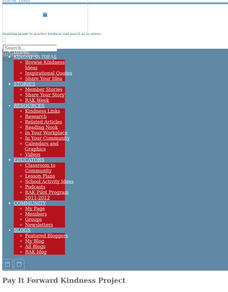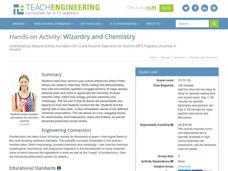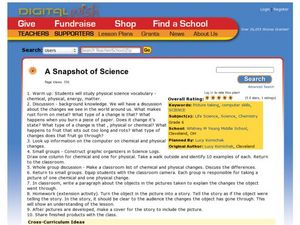Echoes & Reflections
Jewish Resistance
Resistance to the Holocaust took on many forms. Learners explore the passive and active resistance of Jewish people who continued their practices and observances, as well as organized resistance against the evils of the Nazis. An...
Federal Reserve Bank
Money and Inflation: A Functional Relationship
What is the difference between money and bartering, and how is money valued when considering inflation? Delve into the correlation between these fundamental components of economics with this detailed resource, which consists of reading...
Curated OER
Alexander Used to Be Rich
Reading Alexander, Who Used to Be Rich Last Sunday, launches this lesson appropriate for children who recognize coins and have been introduced to coin values. Using addition and subtraction skills, the class tracks Alexander’s spending...
Perkins School for the Blind
Find the Objects/Beginning Sound Indentification
If you are just starting out as a teacher for children with visual impairments and want a fun way to teach braille and phonemic awareness, look no further. You'll fill 21 boxes with objects that start with specific letter sounds. You'll...
Curated OER
Pay It Forward Project
Create a list of random acts of kindness and have your class perform them during a designated week. Learners will also participate in a project centered around being kind to others. Each grade chooses their kindness project, and then...
Perkins School for the Blind
Tactile quilts that tell a story
Learners with multiple disabilities need to engage in projects that push them to know their full potential. They need to be able to express themselves in a variety of ways, and this very thoughtful lesson does just that. They make a...
Perkins School for the Blind
Beginning Map Skills
Maps can be so much fun, they help you understand spatial relationships, distance between objects, and can foster direction skills. Budding cartographers with visual impairments use the Wheatley Tactile Diagramming Kit to create their...
Teach Engineering
Wizardry and Chemistry
No need to go to Ollivanders to buy a magic wand. In the chemistry lab activity, young magicians mix chemicals to create combustible compounds. By applying these compounds to an iron wire, they create magic wands.
Federal Reserve Bank
Financial Crises, Reform, and Central Banking: Establishing the Federal Reserve
From the First and Second Banks of the United States to the founding of the Federal Reserve, discover how the American nation attempted to reform its financial history throughout the years.
Federal Reserve Bank
Deflation: Who Let the Air Out?
Why do decreasing prices (deflation) restrain economic growth, and why is this a real concern? Here you'll find reading materials and a related worksheet that gets right to the heart of this question, using recent events and real...
Federal Reserve Bank
Monetary and Fiscal Policy in Times of Crisis
Following the 2008 financial crisis in the United States, why did fiscal policymakers increase government spending and reduce taxes? Discover the motivation behind these actions and learn about the separate functions of monetary and...
Federal Reserve Bank
Natural Disasters: From Destruction to Recovery
What are the major economic implications, both good and bad, of natural disasters? Discover the effect that natural disasters can have on labor market conditions, capital, household incomes, and opportunities for reconstruction in local...
Federal Reserve Bank
What Do Financial Market Indicators Tell Us?
Explain the four categories of financial indicators (commodity prices, stock indexes, interest rates, and yield spreads), and help your class members understand how changes in this data can affect decisions regarding consumer spending,...
Prestwick House
Discovering Genre: Poetry
Work on literal and figurative meanings with a instructional activity focused on Robert Frost's "After Apple-Picking" and "The Road Not Taken." Readers identify the literary devices used by the poet to set the poems' themes, settings,...
Echoes & Reflections
Perpetrators, Collaborators, and Bystanders
After the Holocaust, the world grappled with how to bring justice to the Nazis. But what to do with the thousands—if not millions—who allowed it to happen? Young historians consider the issues of guilt, collaboration, and responsibility...
Echoes & Reflections
Antisemitism
Propaganda and anti-semitism were linked to evil ends during the Holocaust. Using video testimony of Holocaust survivors, examples of Nazi propaganda, and discussion questions, learners explore the roots of anti-semitism in Europe and...
Social Studies School Service
Ancient China: Introduction, Map
What a great resource for introducing your youngsters to the world of ancient China and the earliest stages of its timeline. Included are creative ideas for organizing your room, as well as an engaging lesson, anticipatory set, and map...
Open Colleges
Your Brain Map: Strategies for Accelerated Learning
The brain is a complex organ with many different structures and functions. An interactive diagram allows learners to explore the different structures while pop-ups describe their functions. Secondary interactives show the structures of...
Curated OER
A Snapshot of Science
Sixth graders explore physical and chemical changes. In this physical science lesson, 6th graders study vocabulary, discuss the changes they see in the world and look up information on chemical and physical changes. Students create...
Curated OER
Think It, Write It, Create It
Help your scholars create a class story. They will write a page of the story and illustrate that page. Then they use a variety of digital technologies to make the story come alive. A variety of digital resources are recommended for the...
Federal Reserve Bank
What Are the ‘Ingredients’ for Economic Growth?
Delve into the concept of economic growth with your class members, including why economic growth is important, what causes it, and how can countries encourage it.
Federal Reserve Bank
The Great Inflation: A Historical Overview and Lessons Learned
Your young economists will explore the roots of fears about high inflation by learning the effects of rising prices during the world wars and in particular the Great Inflation of the 1970s.
Federal Reserve Bank
The Legacy of the Olympics: Economic Burden or Boon?
Do the economic benefits of major sporting events such as the Olympics or the World Cup outweigh the expected costs? Using fundamental economic terms, discover the explicit and implicit costs and benefits for countries that host these...
Curated OER
What Makes Our Community Special?
Explore websites, complete research, and use technological tools to create a final multimedia presentation on what makes a community special. Learners of all ages work with a partner to research an interesting aspect of their community,...

























